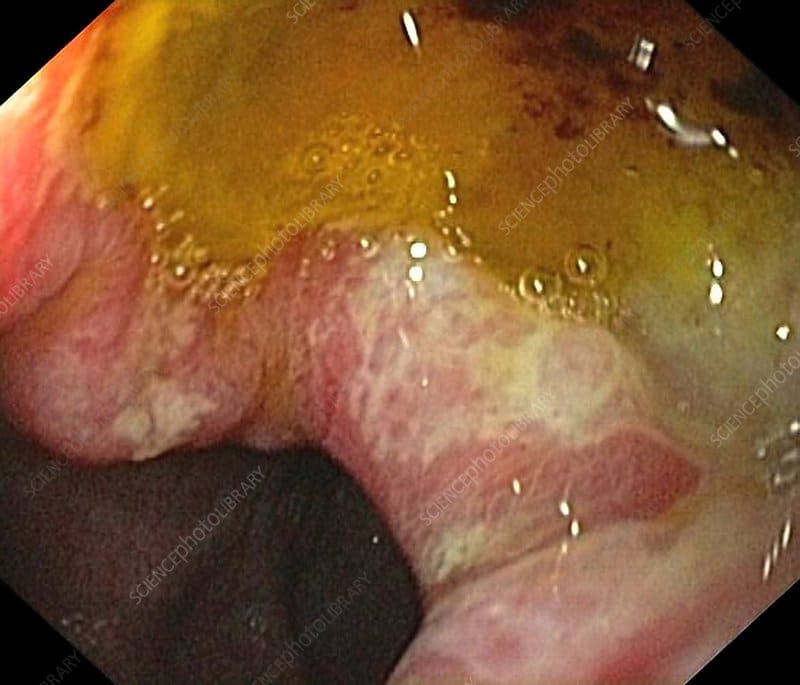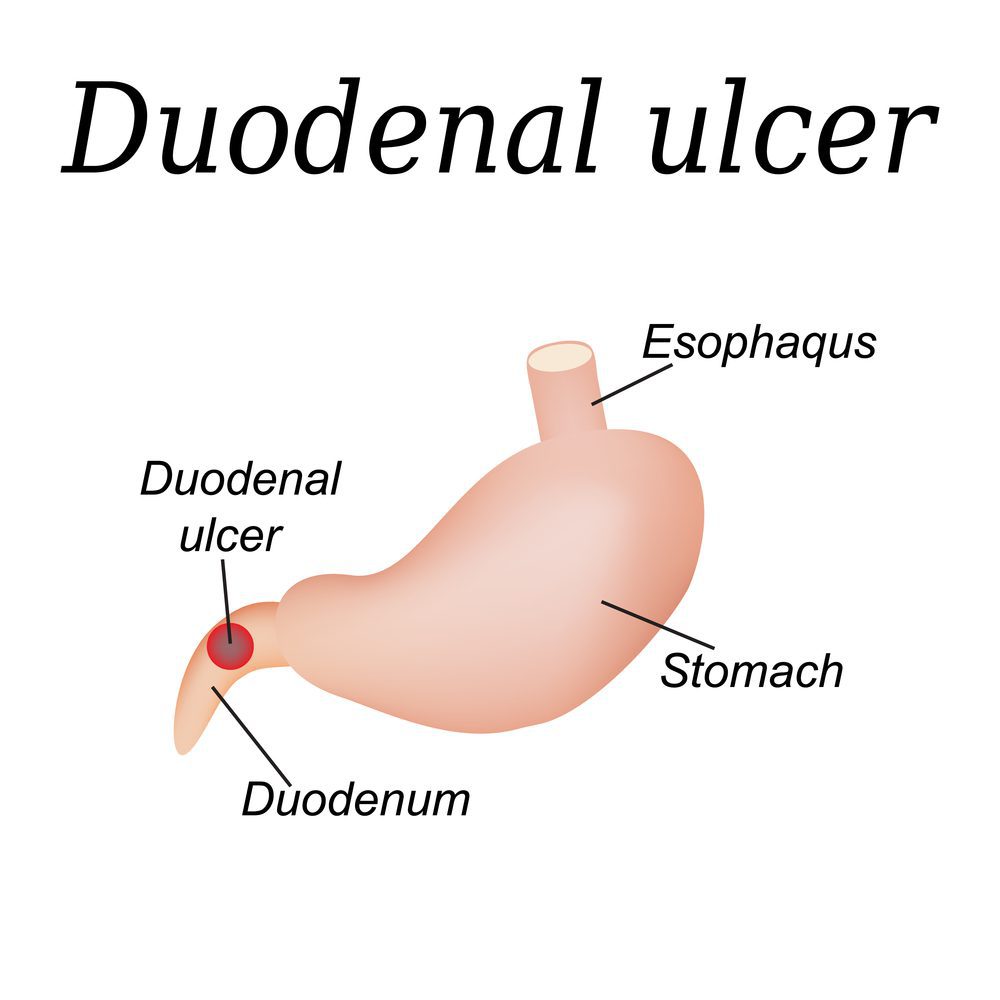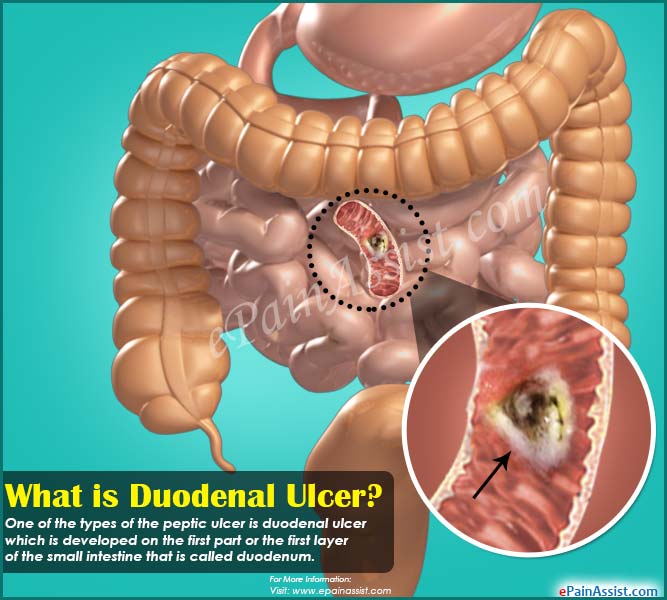Signs Of A Duodenal Ulcer
1. Stomach pain which sometimes becomes more severe and then gets better depending on what you are eating and drinking.
2. Bloating and an overall feeling of fullness especially after you eat
3. Increased gas and a need to burp
4. Nausea and even feeling like you might need to vomit
5. Weight loss which can happen if the ulcer causes any type of blockage in your digestive track which makes it difficult for food to travel through your stomach.
6. Weight gain through comfort eating in order to find pain relief through food that neutralizes the acid build up.
7. Indigestion, sometimes called dyspepsia, which is characterized by discomfort and a burning feeling in your upper abdomen area.
8. Extremely serious ulcer cases can cause more severe symptoms and complications that require immediate medical attention including blood in your stool.
If you think that you might be suffering from a duodenal ulcer, you should seek out experienced medical attention. When left untreated, duodenal ulcers can lead to more serious complications including bleeding and even perforations in your intestine. There are certain tests that your gastroenterologist may perform for diagnostic purposes. An endoscopy is often used to diagnose a duodenal ulcer. Through this test your physician is uses a flexible telescope which provides visibility in the duodenum so that ulcers can be detected. Your doctor may also test you to see if you have H. pylori.
Mayo Clinic Q And A: How Is A Peptic Ulcer Treated
DEAR MAYO CLINIC: Last year,I was diagnosed with heartburn due to a peptic ulcer. My doctor suggested that I see a specialist. Who should I see, and what type of treatment is available?
ANSWER: Many people will note that they have “heartburn,” and it is important to know that such a symptom could be related to one of several issues in the digestive tract, including peptic ulcer disease. This is where visiting with a health care professional who specializes in disorders of the gastrointestinal tract a gastroenterologist can help.
Once diagnosed and treated, ulcers usually heal within several months. But a gastroenterologist can help you find the underlying cause of your ulcer and decide on the best treatment going forward.
A peptic ulcer is an open sore on the inside lining of the stomach or the upper part of the small intestine. Peptic ulcers are not rare, and their frequency can depend on age, gender, other medical issues, medications and geography.
It’s possible to have a peptic ulcer and not have any symptoms, although they may cause stomach pain. In some people, a peptic ulcer isn’t identified until they experience symptoms related to a complication from an ulcer, such as bleeding or a hole in the lining of the stomach or bowel.
H. pylori is a bacterium that can live in the mucous layer covering the lining of the stomach. It doesn’t always lead to health problems, but it can sometimes trigger inflammation of the stomach’s inner layer, producing an ulcer.
Duodenal Ulcer Symptoms In Women What Else
Besidesupper abdominal pain, the open sore may also cause the following signs andsymptoms:
Less often, the open sore might also cause more serious signs and symptoms such as anemia, appetite loss, weight loss without trying, feeling faint, breathing problem, vomiting blood, and passing tarry-dark stools . Some of these may signal ulcer complications such as internal bleeding.
This article is for general information only. For any abnormal signs and symptoms that persist or get worse seek immediate medical help without delay! Discuss more with healthcare professionals in your local area for more guidance.
Also Check: How To Repair An Ulcer
Other Possible Causes Of Abdominal Pain In Women
Abdominalsymptoms are probably more common in women,according to MSD manual. There are several answers onthis, one of the main ones could be hormonal fluctuations .
In olderwomen, for example, menopause may cause abdominal discomforts more likely especiallyin those with endometriosis, IBS , and inflammatorybowel disease.
It seemsthere are a wide range of conditions to blame for female abdominal discomforts.Besides stomach and duodenal ulcers, the following common health conditions mayalso cause abdominal symptoms in women:
How Can I Be Sure Its An Ulcer

The only way to be sure an ulcer is causing your discomfort is with a medical diagnosis. We will evaluate your medical history and conduct a thorough physical examination.
To determine the root cause of your ulcer, we may run blood, stool, or breath tests. These tests are designed to look for signs of helicobacter pylori, the bacteria linked to ulcers.
Depending on your unique symptoms, we may also order an endoscopy. During an endoscopy, we insert a tube with a tiny camera down your throat and into your stomach to take pictures of any potential damage and collect tissue samples for analysis.
Read Also: Foods To Avoid With Ulcers Mayo Clinic
What Is A Stomach Or Duodenal Ulcer
An ulcer is an open sore, or lesion, usually found on the skin or mucous membrane areas of the body.
- An ulcer in the lining of the stomach or duodenum, where hydrochloric acid and pepsin are present, is referred to as a peptic ulcer.
- When the ulcer is in the stomach, it is called a gastric ulcer.
- When the ulcer is in the duodenum, it is called a duodenal ulcer.
What Causes A Duodenal Ulcer And Who Is More At Risk
Our stomach is lined with a mucus-producing inner layer known as the mucosa. This layer is delicate, and its integrity depends on a careful balance of protective factors and destructive factors .
The risk of duodenal ulcer is increased in males and in those who:
- Skip breakfast or more than one meal
- Smoke cigarettes
- With Helicobacter Pylori infection
- With a family history of peptic ulcer disease
Other factors that have been associated with an increase in peptic ulcer disease include:
- Other medical conditions, such as liver disease, Crohns disease, or Zollinger-Ellison syndrome
- Physical stress, such as major surgery or burns
Read Also: Hind Gut Ulcers In Horses Symptoms
Home Remedies For Ulcer Pain
What Tests Will Be Done To Diagnose A Peptic Ulcer
Endoscopy. An upper endoscopy exam is expedient because allows healthcare providers to see inside your digestive tract and also take a tissue sample to analyze in the lab. The test is done by passing a thin tube with a tiny camera attached down your throat and into your stomach and duodenum. Youll have medication to numb your throat and help you relax during the test. Your healthcare provider may use the endoscope to take a tissue sample to test for signs of mucous damage, anemia, H. pylori infection or malignancy. If they take a sample, you wont feel it.
Imaging tests. Imaging tests to look inside the stomach and small intestine include:
- Upper GI series. An upper GI X-ray exam examines the stomach and duodenum through X-rays. Its less invasive than an endoscopy. For the X-ray, youll swallow a chalky fluid called barium, which will coat your esophagus, stomach and duodenum. The barium helps your digestive organs show up better in black and white images.
- CT scan. Your healthcare provider might recommend a CT scan if they need to see your organs in more detail. A CT scan can show complications such as a perforation in the stomach or intestinal wall. For the test, youll lie on a table inside a scanner machine while X-rays are taken. You may drink or have an injection with contrast fluid to make your organs show up better in images.
Tests for H. pylori. Your healthcare provider might want to test you separately for H. pylori infection. Tests may include:
You May Like: Ulcerative Colitis And Life Insurance
What Tests May Be Done
- Gastroscopy is the test that can confirm a duodenal ulcer. In this test a doctor or nurse looks inside your stomach and the first part of your small intestine . They do this by passing a thin, flexible telescope down your gullet . They can see any inflammation or ulcers.
- A test to detect the H. pylori germ is usually done if you have a duodenal ulcer. If H. pylori is found then it is likely to be the cause of the ulcer. Briefly, it can be detected in a sample of stool , or in a breath test, or from a blood test, or from a biopsy sample taken during an endoscopy. See the separate leaflet called Helicobacter Pylori for more details.
Possible Effects On Bone And Soft Tissue Healing
It has been hypothesized that NSAIDs may delay healing from and by inhibiting inflammation. On the other hand, it has also been hypothesized that NSAIDs might speed recovery from soft tissue injuries by preventing inflammatory processes from damaging adjacent, non-injured muscles.
There is moderate evidence that they delay bone healing. Their overall effect on soft-tissue healing is unclear.
Recommended Reading: Best Probiotic For Stomach Ulcers
What Kind Of Doctor Treats Peptic Ulcers
- If you suspect you may have a peptic ulcer, you may first be diagnosed by your family practitioner or internist.
- Children or teenagers may see a pediatrician.
- For further treatment you will likely be referred to a gastroenterologist, a specialist in disorders of the digestive tract.
- If you have an emergency such as vomiting or severe abdominal pain you will be seen by an emergency medicine specialist in an emergency room.
- In the rare case where surgery is needed, you may see a general surgeon.
If your stomach ulcers caused by a Helicobacter pylori bacterial infection, youll be given:
- a course of antibiotics
- a medication called a proton pump inhibitor
This is also recommended if its thought your stomach ulcers caused by a combination of an H. pylori infection and non-steroidal anti-inflammatory drugs .
Read Also: Meal Replacement Shakes For Ulcerative Colitis
What Is A Stomach Ulcer

A stomach ulcer, also called a gastric ulcer, is an open sore that develops in your stomach lining. You can also get one in your duodenum, the first part of the small intestine that your stomach feeds into. Duodenal ulcers and stomach ulcers are both types of peptic ulcers. Theyre named for pepsin, one of the digestive juices that are found in the stomach and that sometimes leak into the duodenum. These juices are a contributing factor in peptic ulcer disease.
Peptic ulcers occur when the protective mucous lining in your stomach and duodenum has been eroded, allowing gastric acids and digestive enzymes to eat away at your stomach and duodenal walls. This eventually results in open sores that are continually irritated by the acid. If left untreated, they can begin to cause serious complications, such as internal bleeding. Over time, they can even wear a hole all the way through. This is a medical emergency.
Also Check: Low Dose Naltrexone Ulcerative Colitis
Don’t Miss: What Can You Do For Mouth Ulcers
Pearls And Other Issues
In younger patients who have duodenal ulcers that are distal to the duodenal bulb, always check a fasting gastrin level to evaluate for a hyper-gastrin state, such as gastrinoma. In older patients with the same finding, consider CT angiography, especially of the celiac trunk and superior mesenteric artery, to assess chronic ischemia.
Duodenal Ulcer In Women
Ingeneral, gender has no significant effect for the risk of developing duodenalulcer. So its not only a womans issue since it also affects men!
As the name suggests duodenal ulcer is a break that forms in the lining of duodenum which is the first part of your small intestine close to your stomach . There is also a condition called stomach ulcer, a peptic ulcer that forms in the stomach lining.
Peptic ulcer can also develop in the lining of esophagus . But this esophageal ulcer is much less common.
This open sore was thought as a consequence of genetic , bad lifestyle factors , and stress until the mid-1980s. It was believed that such factors play a key role to digestive acid buildup which then erodes the protective lining of duodenum.
Nowadaysits thought that those factors still have an effect but theyre not theprimary causes for the disease. Now we know that the two primary causes toblame are Helicobacter pylori infection and long-term use of NSAIDs .
Studyconducted since several decades ago has suggested that H. pylori infectionexists in about 90 percent of duodenal ulcers though some recent studies alsosuggest this number is probably declining.
Thestory is not different for NSAIDs. These pain relievers, especially when youtake them in long term, are the second common culprit for ulcers. They mayinterfere with the stomachs and duodenums ability to protect the soft liningfrom digestive acids .
You May Like: Pressure Ulcer Prevention Nurse Teaching
Signs You May Have An Ulcer
Did you know that stomach ulcers also called peptic ulcers affect at least 1 in 10 Americans over the course of their lives? And while stomach ulcers can be treated easily when caught early, lack of medical care can lead to serious complications.
Understanding the signs of stomach ulcers is important in helping you get the treatment you need. At Prima Medicine in Fairfax and South Riding, Virginia, our care team has the experience and knowledge to diagnose and treat stomach ulcers. Weve curated this guide to help you recognize the warning signs of an ulcer and understand what you can do about it.
What Is A Duodenal Ulcer
Duodenal ulcers are a common cause of abdominal pain. Once treated, they usually get better in a matter of weeks.
A duodenal ulcer is a sore that forms in the lining of the duodenum. Your duodenum is the first part of your small intestine. This is the part of your digestive system that food travels through, after it leaves your stomach.
You can get an ulcer in your stomach as well as in your duodenum. Stomach ulcers and duodenal ulcers are both types of peptic ulcers. If you have either of these, you have what’s called ‘peptic ulcer disease’.
Also Check: Icd 10 Stage 3 Pressure Ulcer Sacrum
When Should I Call My Healthcare Provider
See your healthcare provider right away if you have any of these symptoms:
- Vomiting blood or dark material that looks like coffee grounds
- Extreme weakness or dizziness
- Blood in your stools
- Nausea or vomiting that doesnt get better, or gets worse
- A sudden, severe pain that may spread to your back
- Losing weight without even trying
Untreated peptic ulcers may cause other health problems. Sometimes they bleed. If they become too deep, they can break through your stomach.
Ulcers can also keep food from going through your stomach.
How Is An Ulcer Diagnosed
Your doctor will ask you about your symptoms. They may do an endoscopy. This procedure involves inserting a thin, flexible tube attached to a camera down your throat and into your stomach. Your doctor will test your blood, breath or stool for H. pylori. They also can test a sample of your stomach lining. Your doctor also will ask you if you regularly take aspirin or anti-inflammatory medicines.
Recommended Reading: Alternative To Sulfasalazine For Ulcerative Colitis
What About Complicated Ulcers
While most ulcers are successfully treated with medication, some complicated ulcers may require surgery. Ulcers that are bleeding, or that have perforated your stomach or intestinal wall, will need to be surgically repaired. An ulcer that is malignant, or obstructing a passageway, will need to be surgically removed. In severe cases, an ulcer that keeps coming back may be treated by surgery to cut off some of the nerve supply to the stomach that produces stomach acid.
General Causes Of Duodenal Ulcers

There is typically a balance in between the quantity of acid that you make and the mucous defense barrier. An ulcer might develop if there is a modification in this balance, allowing the acid to harm the lining of the stomach or duodenum. Causes of this consist of the following:
Infection with H. pyloriInfection with H. pylori is the cause in about 19 in 20 cases of duodenal ulcer. More than a quarter of people in the UK become contaminated with H. pylori at some stage in their lives. See the separate leaflet called Stomach Pain for additional information.
Anti-inflammatory medicines â including aspirinAnti-inflammatory medicines are sometimes called non-steroidal anti-inflammatory drugs . These medicines sometimes impact the mucous barrier of the duodenum and allow acid to trigger an ulcer.
Other causes and factorsOther reasons are unusual â for example, the Zollinger-Ellison syndrome. In this rare condition, much more acid than usual is made by the stomach.
Other factors such as cigarette smoking, stress and drinking significantly might increase the risk of having a duodenal ulcer. However, these are not typically the underlying reason for duodenal ulcers.
Also Check: Natural Supplements For Ulcerative Colitis